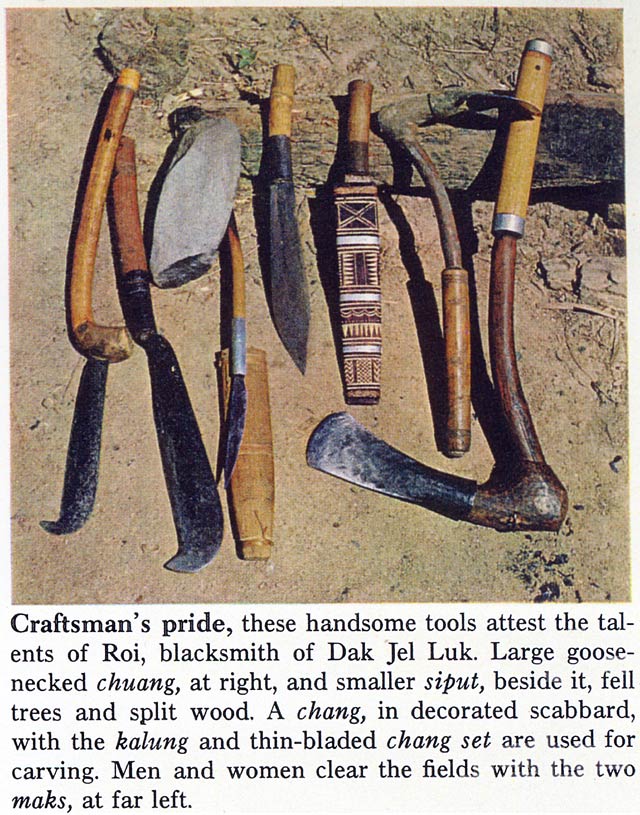
 |
|
|
#1 | |
|
Member
Join Date: Nov 2004
Location: USA
Posts: 1,725
|
I recently picked up this mak from eBay. To my suprise and delight, the blade is copper! Quite large, heavy and sharp, too.
 To my eye, the wood handle and blade exhibit significant age. The wood is hard, dark and well-seasoned. The patination on the blade is a deep, rich brown, almost black in places. A few, small areas of verdigris are present, and the copper material is most evident at the edge (where sharpened) and in small areas near the handle where cleaning was undertaken. The white metal plate affixed to the base of the blade and the bands seem like more recent additions, as they are more crudely manufactured than the rest of the weapon, and affixed by nails. The seller provided this information: Quote:
|
|
|
|

|
|
|
#2 |
|
Vikingsword Staff
Join Date: Nov 2004
Posts: 6,387
|
It might be that in Thailand copper is considered an especially deadly or spiritually signifigant metal .
In Toer's Buru Quartet series written about colonial Jawa there is an asassination done with a non ferrous blade because of its supposed superior deadly properties . |
|
|

|
|
|
#3 |
|
Vikingsword Staff
Join Date: Dec 2004
Location: The Aussie Bush
Posts: 4,650
|
Andrew:
Interesting item. Blade decoration looks N. Thai or Lao. I think copper per se would be too soft to hold any kind of edge. Much more likely to be an alloy of copper, and bronze obviously comes to mind because it can be quite hard and durable (much more so than brass). What chance this may be an old bronze mak? In which case it could be a very old blade. Ian. |
|
|

|
|
|
#4 |
|
Member
Join Date: Nov 2004
Location: USA
Posts: 1,725
|
Hi Ian. I had similar thoughts on the decorative motifs.
If it's not copper, the blade must be a very high-copper content alloy. In some areas, the metal has a shiny, red appearance. It seems like it's holding a nice edge, but it must be fairly soft as the very distal 0.3 cm of the tip is folded over on itself. It's pretty substantial, enough so that I'd be suprised if this was a purely ceremonial weapon. (Although the extreme rarity of useable copper-bladed weapons in general doesn't really support this.  ). ).I'll try to get some close-ups posted. The auction photos aren't great. |
|
|

|
|
|
#5 | |
|
Member
Join Date: Nov 2004
Location: USA
Posts: 1,725
|
Quote:
Something's definitely "up" with this one, Rick. In my research, I have yet to come accross anything specifically relating to any special properties assigned to copper in Continental SEA. Copper use does have a long history in the region, and it's frequently seen as decoration on weapons, but this is the first such weapon I've personally seen or handled. Maybe PUFF can help us out here? EDIT: I do recall reading somewhere (Philip Tom article, perhaps) that some Vietnamese parade weapons were made with copper blades. Non-ancient copper weapons are, in my limited experience, rare, particularly in regions with better weapon-making materials and technology available. |
|
|
|

|
|
|
#6 |
|
Member
Join Date: Jan 2006
Posts: 123
|
It looks as if they might have used it for plowing the land to grow crops.
|
|
|

|
|
|
#7 |
|
Member
Join Date: Feb 2006
Location: 30 miles north of Bangkok, 20 miles south of Ayuthaya, Thailand
Posts: 224
|
As Rick metioned, there is a believe that copper contains a power of "spell bleaching". So, copper-bearing weapons 's a choice when dealing with a person with spiritual protection (tatoo, amulet etc.). That 's why some blades are decorated with copper plugs. IMHO, a blade made of copper or bronze like this might be used by a law enforcer in a mission against spiritual-protected bandit
 . .The blade can be harden by work hardening (cold working), which 's enough to make a simple cutting tool. I have never saw Siamese weapons like this nor heard of Siamese "mak".  (I have to check with the museum or other experts) The word could be Burmese, as described by the former owner (Mak in Burmese means army, soldier). (I have to check with the museum or other experts) The word could be Burmese, as described by the former owner (Mak in Burmese means army, soldier).
Last edited by PUFF; 18th April 2006 at 08:28 AM. |
|
|

|
|
|
#8 |
|
Member
Join Date: Feb 2006
Location: 30 miles north of Bangkok, 20 miles south of Ayuthaya, Thailand
Posts: 224
|
I know only this one,

|
|
|

|
|
|
#9 |
|
Member
Join Date: Dec 2004
Location: Philadelphia, Pennsylvania, USA
Posts: 54
|
Re: Vietnamese parade swords
I have come across a few kiem that had copper blades. They were all very late and very clearly not meant for combat. Whereas steel-bladed kiem can be considered ceremonial swords, the copper-bladed ones might more correctly be considered ceremonial sword-like objects. They are completely unlike your mak, which has some genuine heft and genuine age. I have seen nothing like it. |
|
|

|
|
|
#10 |
|
Vikingsword Staff
Join Date: Dec 2004
Location: The Aussie Bush
Posts: 4,650
|
Puff:
Mak is a term used by some of the Montagnard tribes to describe the axe they use in agriculture and presumably for a weapon. The markings on the blade of this one are consistent with those of some of the groups in northern Thailand/Laos/Vietnam. There was a discussion of mak on the previous EEWRS Forum and a nice picture posted of Montagnard weapons that appeared in a National Geographic. Here is the thread: http://www.vikingsword.com/ubb/Forum1/HTML/002010.html And here is the picture from National Geographic.  Ian. |
|
|

|
|
|
#11 | |
|
Member
Join Date: Nov 2004
Location: USA
Posts: 1,725
|
Quote:
|
|
|
|

|
|
|
#12 | |
|
Member
Join Date: Nov 2004
Location: USA
Posts: 1,725
|
Quote:
Thanks, Nick. Good to see you. |
|
|
|

|
|
|
#13 | |
|
Member
Join Date: Nov 2004
Location: USA
Posts: 1,725
|
Quote:
http://www.vikingsword.com/vb/showth...ghlight=%2Amak |
|
|
|

|
|
|
#14 | |
|
Member
Join Date: Dec 2004
Posts: 987
|
Dan Wilke, in his interview with Khun Nattapat (Director of the Research Center for the Thai Nation Museum, and senior weapons curator), learned that the mak is a Lop Buri period Thai weapon (11th-13th C). I have posted in a few places a picture of a section of a relief at Angkor Wat, in Cambodia, showing these being used as cavalry weapons. This relief is either 12th century, or 14th-15th century based on 12th century style books. In either case it is likely to have been made by Thai artists.
In form it seems to have been both a weapon and a tool, but clearly there are examples that were made exclusively for use as weapons. Copper blade - never seen one, either. The existance of copper-bladed kiem shows the idea was in circulation at least in the Eastern region. I have to agree that a copper blade (no matter how hardened) would not stand up to serious wear as either weapon or tool, which makes it unlikely that this was intended for either. Unless it is really really ancient, as in Bronze Age, I can't see why someone would chose copper to make a "user" blade, since iron and/or steel were hardly rarities in the region. I vote for status symbol or ritual use (casting out demons, breaking spells, whatever). In Burma the "Invulnerables," elite warriors believed to be magically protected from their enemies, inserted pieces of metal and precious stones under the skin for their talismanic protection (in addition to have special tattoos). Snodgrass, in his 1826 "Narrative of the Burmese War," writes Quote:
I would have to go back and check another source that discusses the use of talismans in Thailand to see if copper was one of them. The question of its significance had been discussed in connection with those little copper and brass inserts commonly seen on the spines of Thai daab & some Burmese dha, and as I recall the sources I have were not clear on copper in particular. The brightness of the edge on this mak is interesting. It makes it look like it was used at least somewhat for cutting. What do you think about the added plate on the handle? Protection of the wood, or decoration? |
|
|
|

|
|
|
#15 |
|
EAAF Staff
Join Date: Dec 2004
Location: Louisville, KY
Posts: 7,368
|
Mark,
with this mak (the knife  ) are the rings on it silver? This may add a dimension to the debate of ceremonial or not. ) are the rings on it silver? This may add a dimension to the debate of ceremonial or not.
|
|
|

|
|
|
#16 |
|
Member
Join Date: Dec 2004
Posts: 987
|
Hopefully Andrew can answer the question of the ring metal (I wish it were mine, but its his
 ). ).I found the reference to use of talismans in Thailand (it's in a catalogue written by Khun Nattapat for a museum exhibition several years ago), but it doesn't specify anything about which particular metals were used as talismans. So, nothing new on what significance the copper might have. |
|
|

|
|
|
#17 |
|
Member
Join Date: Nov 2004
Location: USA
Posts: 1,725
|
I'll take another look tomorrow, but I don't think the plate at the base of the blade and the bands are silver. They seem like more recent additions and do not reflect the same quality as the handle and blade. The base plate may be a repair, as damage to the wood handle in this area from the tang seems likely.
|
|
|

|
|
|
#18 |
|
Member
Join Date: Nov 2004
Location: USA
Posts: 1,725
|
Better a late response than never.
 The plate and bands appear to be aluminum, and not original. I believe the plate was added to repair damage to the wood at the base of the blade, but haven't removed it to check. The blade itself is heavy and substantial. |
|
|

|
|
|
#19 |
|
Member
Join Date: Dec 2004
Location: What is still UK
Posts: 5,955
|
Judging from the picture this must be an object of some importance. The wood halft show age and care in manufacture. I would think most nonferrous weapons are pretty good to stab with. They will cut is true but I do not think one would cut with this mak, unless you really had to. If it was held as special in the original context, it may be quite old and repairs would be carried out as and when required. I would not fancy being bludgeoned with for sure.

|
|
|

|
|
|
#20 |
|
EAAF Staff
Join Date: Dec 2004
Location: Louisville, KY
Posts: 7,368
|
Taking another look at this puppy, I would not say bronze or brass but copper -
and BTW - actually brass is stronger (and thus more brittle) than bronze. I'm still thinking this is ceremonial. |
|
|

|
 |
|
|